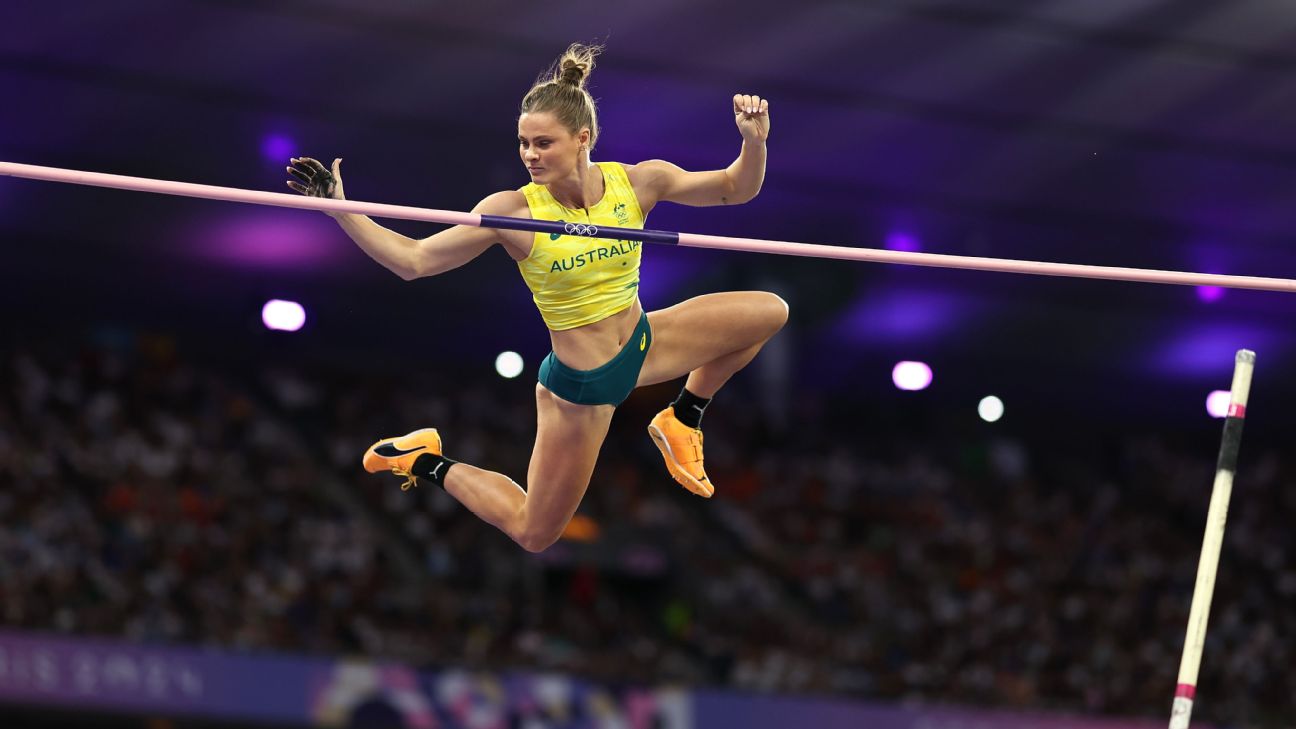Three medals. Make that THREE MEDALS. No, make it THREE OLYMPIC MEDALS, topped by a magnificent gold medal for Nina Kennedy in the pole vault.
Indeed, the medals came from start to finish on Wednesday, 8 August in Paris. Bronze for Rhydian Cowley and Jemima Montag in the mixed relay marathon road walk in the morning, bronze for Matt Denny in the discus, and then Kennedy’s gold in the dying moments of the day’s program at the Stade de France.
It doesn’t get much better than that. Perhaps it only ever has the once. Australia took four on 18 October in Mexico City in 1968 – Maureen Caird (gold) and Pam Kilborn (silver) in the hurdles, Raelene Boyle (silver) and Jenny Lamy (bronze) in the 200. These latest three come in an era when there’s more events, via the expansion of the women’s program, and more medals available. But they are simultaneously that much harder to win as more nations compete, and most of them boast athletes capable of taking medals. St Lucia and Dominica, for example.
Medals in athletics remain the most precious gold, silver and bronze at the Olympic Games. Three in a day in Paris, even if not unprecedented, is a strong contender for Australia’s greatest day in Olympic athletics. Maybe the Mexico City and Paris days can share top billing, as Kennedy did with Katie Moon at the world championships in Budapest last year.
Wouldn’t you know, a year later the Olympic pole vault gold medal came down to the same two women at the same height – 4.95 metres – which, again, neither leared. This time, however, Moon had reached that height by passing her two remaining attempts at 4.90 where Kennedy had taken the lead with a first-time clearance.
As in Budapest, neither could get over 4.95. Moon failed bother remaining attempts in the contest, Kennedy missed once then did not have to take her final attempt. She had the Olympic gold medal in her pocket, personal bests can wait another day!
The pole vault was, in fact, a marathon after 20 women advanced to the final from qualifying – 11 got in and then the next nine were tied in 12th place. The only other time your correspondent can recall a similar occurrence was at the first world championships in Helsinki in 1983 when a hurricane-like storm washed out the men’s qualifying competition and all 27 advanced to the final.
An unknown Sergey Bubka won then and went on to win at the next five world championships as well. Nina Kennedy is up to two global titles in a row now. Just saying.
If (gold) medals are coming along like peak-hour trams for Nina Kennedy right now, it’s been a slower and more frustrating process for Matt Denny. Fourth in Tokyo, sixth, fourth and fourth in the past three world championships, it seemed he was never going to make it to a medal ceremony.
Now, he has. Denny was all business in the discus final – not that he has not been in the others. He led briefly with 69.31 in the second round before world record holder Mykolas Alekna reached 69.97 a few throws later, breaking the Olympic record set by his father Virgilijus in Athens 20 years ago.
But Denny and Alekna were then both upstaged as 25-year-old Jamaican Roje Stona landed his discus right on the 70m line in round four.
Now Matt Denny was in fourth place with Kristjan Ceh and Daniel Stahl – two who had barred his way to the dais several times before – was more than capable of breaching the 70-metre line. Neither did. And a joyous Denny had his first medal in a global championship. As the discus throwers filed out of the arena, Kennedy had a flag draped around her shoulders celebrating her victory.
“You won?”, Denny asked before the two shared an embrace. A poster moment.
In the marathon walk, Cowley and Montag were always in contention and in a medal position for most of the race after Montag took the pair into a brief lead at the half-way point. Cowley kept them close enough in the third leg, before Montag took over again to climb into third and even into a shot at the silver. As in her individual event, however, she needed another kilometre to get any higher, so it was bronze again.

Other things happened on Australia Day, none more dramatic than in a men’s steeple final in which Soufiane El Bakkali retained the title he won in Tokyo.
So much, so normal. Except El Bakkali never looked comfortable in the entire race until he pushed himself into contention and ultimately victory. World record holder Lamech Girma crashed spectacularly over the race’s third-last hurdle in the final lap. Kenya’s Amos Serem had fallen a little earlier as the pace slowed and the field bunched up.
And American athlete Kenneth Rooks looked to have stolen the race when he burst clear with 300 to run. Somehow El Bakkali negotiated all this, swung wide to get a clear line over the water jump and produced the most ungainly looking sprint to get past Rooks and Abraham Kibiwot on the way to an 8:06.05 win.
Rooks just edged Kibiwot, 8:06.41 to 8:06.47, for the silver medal.
Truly this was a race El Bakkali never looked like winning – until he did!
Five men were under 44 seconds in the men’s 400 in which Quincy Hall came from third to first in the final metres to win in 43.40, 0.04 ahead of Matthew Hudson-Smith with Zambia’s Commonwealth champion Muzala Samukonga third in 43.74.





